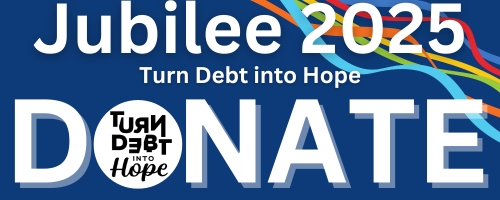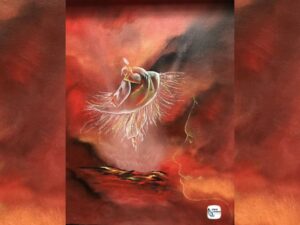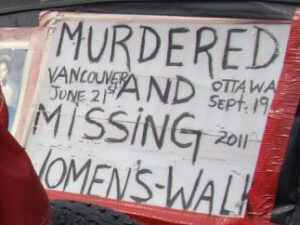Timeline
June 3, 2020 – NWAC gives government failing grade on anniversary of MMIWG inquiry report. Watch video. Read article.
June 30, 2019 – National Inquiry concludes.
June 3, 2019 – Reclaiming Power and Place: The Final Report of the National Inquiry into Missing and Murdered Indigenous Women and Girls and 231 Calls for Justice is released.
Education Guide Their Voices Will Guide Us is released.
June 25-29, 2018 – Institutional hearing on police policies and practices in Regina, Saskatchewan.
June 12-14, 2018 – Expert hearing on racism in Toronto, Ontario.
May 28-June 1, 2018 – Institutional hearing on government services.
May 14-17-21, 2018 – Expert hearing on human rights framework in Quebec City, Quebec.
May 7,2018 – NWAC releases their third report card on the National Inquiry into MMIWG. Read article.
April 4-8, 2018 – Community hearing in Richmond, British Columbia.
March 20-21, 2018 – Community hearing in Thompson, Manitoba.
March 12-16, 2018 – Community hearing in Montreal, Quebec.
March 7-8, 2018 – Community hearing in Happy Valley-Goose Bay, Newfoundland.
February 20, 21, and 22, 2018 – Community hearing in Rankin Inlet, Nunavut.
February 28- March 2, 2018 – Community hearing in Lower Post, British Columbia.
February 13-14, 2018 – Community hearing in Moncton, New Brunswick.
February 5, 6, and 7, 2018 – Community hearing in Prince George, British Columbia.
January 23, 24, and 25, 2018 – Community hearing in Yellowknife, Northwest Territories.
December 4, 2017 – Community hearing in Thunder Bay, Ontario.
November 29-30, 2017 – Sudbury is taking the time to honour MMIWG with a conference organized by the N’Swakamok Native Friendship Centre and Greater Sudbury Police Services. The conference is part of a larger strategy to raise awareness and prevent violence in the community, through the “Looking Ahead to Build the Spirit of Our Women – Learning to Live Free From Violence” project. Read article. Conference details. Read article.
November 26, 2017 – Community hearing in Maliotenam, Québec.
November 20, 2017 – Community hearing in Saskatoon, Saskatchewan.
November 1, 2017 – Interim report Our Women and Girls are Sacred published by the National Inquiry.
October 30, 2017 – Community hearing in Membertou, Nova Scotia.
October 16, 2017 – Community hearing in Winnipeg, Manitoba.
October 10, 2017 – Open letter from families, Survivors and supporters of MMIWGT2S calling for immediate action to reset the National Inquiry. Read press release.
October 6, 2017 – Community hearing in Edmonton, Alberta.
September 26, 2017 – Community hearing in Smithers, British Columbia.
May 30-31, June 1, 2017 – National Inquiry into the Missing and Murdered Indigenous Women and Girls community hearings, Truth Gathering Process begins May 30, 31 and June 1, 2017 at the Kwanlin Dun Cultural Centre in Whitehorse, Yukon Territory. Read statement from Marion Buller, Chief Commissioner.
May 25, 2017 – Community hearing in Whitehorse, Yukon.
May 16, 2017 – Sudbury police service launches its formal public strategy document that responds to its year-long project “Looking ahead to build the spirit of our women: Learning to live free from violence. Sudbury is the only police service so far to create such a strategy. Presentation.
May 12, 2017 – NWAC Releases second Report Card on the National Inquiry into MMIWG. Download the 2nd report card.
January 5, 2017 – NWAC Releases Report Card on the National Inquiry into MMIWG. Read the press release. Download the report card. Drafted to reflect the success of the Inquiry in meeting its directives and mandates as it progresses, NWAC is employing this tool to provide the public with a comprehensive update and in an effort to participate in and actively impact the operations of the inquiry going forward.
December 2016 – Launch of official website: www.mmiwg-ffada.ca
November 3, 2016 – Out of Site, Out of Mind report is released by Amnesty International. It details the myriad effects of large-scale energy projects in northeastern B.C.’s Peace River region, including the influx of temporary workers – a “shadow population” of mostly young men whose presence contributes to the vulnerability of indigenous women and strains social services. Read the report. Read article.
October 5, 2016 – Native Women’s Association of Canada (NWAC) Disappointed With Lack of Progress In National Inquiry into MMIWG. Read the press release.
August 3, 2016 – Pauktuutit, the national Inuit women’s association release a statement expressing their disappointment in the lack of an Inuit Commissioner on the National Inquiry.
August 3, 2016 – The Native Women’s Association of Canada’s (NWAC)’s 11-year campaign for a National Inquiry is a steadfast reality as a result of the Government of Canada’s announcement today on the launching of the National Inquiry into Missing and Murdered Indigenous Women and Girls. Read the press release. Lire le communiqué.
August 3, 2016 – Indigenous Affairs Minister Caroline Bennett releases the names of the Commissioners who will lead the national inquiry into missing and murdered Indigenous women. Profiles of the Commissioners can be found on the Indigenous and Northern Affairs website.
July 20, 2016 – KAIROS joins other organizations in expressing concern that the draft Terms of Reference (TOR) for the National Inquiry into Missing and Murdered Indigenous Women and Girls in Canada fall short. Read the statement.
February 26, 2016 – The National Roundtable brings together family members of missing and murdered Indigenous women and girls, National Aboriginal Organizations (NAOs) and representatives from the federal, provincial and territorial governments. The second National Roundtable was held on Feb. 26, 2016, hosted by the Manitoba Premier. Three priority areas were identified for discussion: Prevention and Awareness; Community Safety; and Policing Measures and Justice Responses.
Outcomes and Priorities from the 2016 National Roundtable . This document acknowledges the importance of a national inquiry on MMIWG and builds on the FPT Justice Framework to Address Violence Against Indigenous Women and Girls.
February 15, 2016 – An article on CBC suggests the inquiry may begin by summer, 2016, “The federal government hopes to have the inquiry up and running by the summer but it must first decide what the inquiry’s mandate should be.
January 15, 2016 – An open letter calls on the federal government for a national and comprehensive inquiry into missing and murdered Indigenous Women and Girls. The letter is signed by: Native Women’s Association of Canada (NWAC), Canadian Feminist Alliance for, International Action (FAFIA), Amnesty International, Women’s Legal Education and Action Fund, Kairos
December 2015 to February 2016 – Pre-Inquiry Design Process
Pre-inquiry consultations led by the Minister of Indigenous and Northern Affairs, Carolyn Bennett, the Minister of Justice and Attorney General of Canada, Jody Wilson-Raybould and the Minister of Status of Women, Patty Hajdu. Consultations intend to gather input into the design of the inquiry from various stakeholders including survivors, family members and loved ones, Indigenous organizations and communities, provincial and territorial representatives, front-line organizations and others. The consultations heard from over 1300 people. Summaries from the meetings are posted on the Indigenous and Northern Affairs website.
December 8, 2015 – Federal Government announces the launch of an Inquiry into missing and murdered Indigenous women. The Government of Canada website provides resources and updates.
June 2, 2015 – Truth and Reconciliation Commission Call to Action #41 calls for the federal government to launch an inquiry into missing and murdered Indigenous women.
March 1, 2015 – Amnesty International publishes a critical summary of the National Roundtable It puts out a call to the national government to stop the violence against Indigenous women.
February 26-27, 2015 – People’s First Gathering on Missing and Murdered Indigenous Women. Read the summary report.
2014 – United Nations releases the report: “The Situation of Indigenous Peoples in Canada – Report of the Special Rapporteur on the rights of indigenous peoples, James Anaya, UN Special Envoy”
2014 – Legal Strategy Coalition on Violence Against Indigenous Women (LSC) releases “Violence Against Indigenous Women and Girls: A Consolidated Literature Review”. It reviews fifty reports containing over 700 recommendations on violence against Indigenous women and girls and reveals that only a few recommendations have been acted on.
2014 – Royal Canadian Mounted Police (RCMP)’s “Missing and Murdered Aboriginal Women: A National Operational Review” identifies a total of 1,181 missing and murdered Indigenous women.
November 1, 2012 – Assemblies of First Nations releases “Coordinated and Urgent Action to End Violence Against Indigenous Women & Girls – Towards a National Action Plan”
October 4, 2011 – A joint statement signed by 14 groups is released in support of the Sisters in Spirit Vigils. “A Joint Statement to be read nationwide on October 4th 2011 as part of Sisters In Spirit Vigils—A Movement for Social Change”.
2010 – Native Women’s Association of Canada (NWAC) Sisters in Spirit initiative defunded
2009 – Native Women’s Association of Canada (NWAC) produces “Voices of Our Sisters in Spirit: A Report to Families and Communities” 2nd edition (March 2009) that proves there are over 582 missing and murdered Indigenous women in Canada.
September 2007 –The Ontario Native Women’s Association (NWAC) & the Ontario Federation of Indian Friendship Centres releases “A Strategic Framework to End Violence Against Aboriginal Women”.
March 2006 – Highway of Tears Symposium is held in Prince George, B.C. to raise public awareness and create a call for action regarding the missing and murdered women on the stretch of Highway 16 in B.C. now known as the Highway of Tears (Highway of Tears Symposium Recommendations Report (2006). Highway of Tears Initiative launched as a result of the Symposium.
2005 – Native Women’s Association (NWAC) begins Sisters In Spirit initiative. This initiative is funded by Status of Women Canada (SWC) to conduct research into violence against Aboriginal women.
2004 – Amnesty International releases “No More Stolen Sisters” Report
2002 – Native Women’s Association, Amnesty International Canada, KAIROS, Elizabeth Fry Society, the United Church and the Anglican Church form “National Coalition for our Stolen Sisters”.








